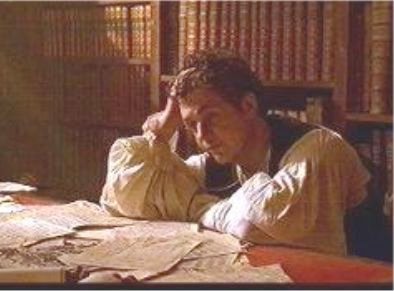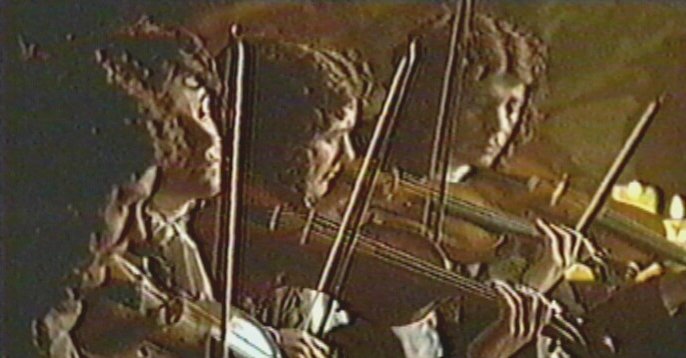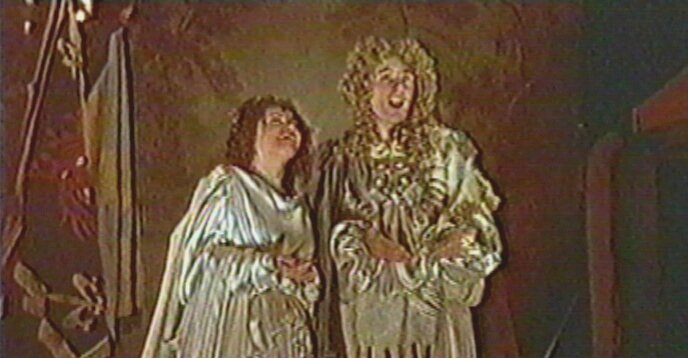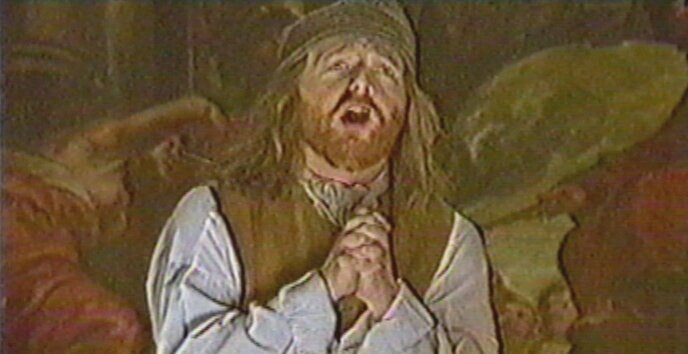
England, My England
CD Sleeve Notes by Music Critic
and Broadcaster, Michael White
![]()

England, My England
CD Sleeve Notes by Music Critic
and Broadcaster, Michael White
![]()
When Charles II landed at Dover to reclaim the throne of England after ten years’ exile, he might have dignified that historic moment with some fine and noble statement as he stepped down from the boat. In fact he complained that there was dog-shit on his shoe. And so it often is with history: portentous circumstances punctured by banality.
Charles’s court composer, Henry Purcell, lived through more portentous circumstances in his short life than most of us could cope with. The end of the Commonwealth, the restoration of the monarchy, three kings, one queen, a bloodless revolution, the plague, the great fire of London all fell within the compass of his 36 years; and as a man of prominence in royal service, at the heart of London society and London life, he would have felt the impact of all these things very directly. They certainly left their mark on his music.
But for all his closeness to great events, the details of his life passed largely unrecorded – presumably because, like that of most composers, it was in itself a rather mundane life, spent largely at a desk producing the enormous quantity of work which stands as his memorial. Biographies of Purcell are driven to persistent and despairing remarks about ‘how tantalisingly little’ we know or ‘how equivocal the evidence’ is for even basic issues like his date of birth and parentage. And lack of data was the understandable objection John Osborne raised when the director Tony Palmer put to him the idea of a Purcell film to celebrate the tercentenary of the composer’s death. There would be too many holes to plug.
But lack of data can be liberating as well as limiting. The cinema has, after all, a long track-record for plugging the holes in the lives of long dead composers with cinematic fantasy, and Osborne finally came up with a solution. It wasn’t orthodox, but then Palmer’s films about composers – an impressive catalogue including Wagner, Britten, Walton, Shostakovich and Handel (also with a script by Osborne) – never are.
Essentially there were two possible approaches. One was to fabricate the personal history and show Purcell striding through the fields in search of inspiration, jotting down ideas as he prepared the Sunday lunch, in the time-honoured way of film biography. The other was to take what Palmer calls 'a great leap of imagination' and flesh out the skeleton of known fact with some kind of counter-plot. Needless to say, the counter-plot idea was more attractive; and the way to handle it was fixed when Osborne heard a tape of Benjamin Britten's Young Person's Guide to the Orchestra, a modern set of variations on a Purcell theme. The film would time-travel between the 17th and 20th centuries, playing the events of the past against the attempts of a latterday theatre company to recreate the past on stage.
How latterday this company might be is never clear in the film: there are conflicting clues designed to broaden the time-shift out into a general, unspecific sense of Then and Now. But the weight of the clues favours the 1960s; and although Osborne is no longer around to explain why (this was his last script before he died; additional dialogue was added by a colleague, Charles Wood), Tony Palmer recalls that 'John was transfixed by the way the 1960s, like the 1660s, were a period of optimism and energy for a better future that didn't materialise. Perhaps the parallels there aren't perfect, but for his purpose they were sufficient. They established a relationship. And they supported a point he wanted to make in the film about the values of 'englishness' and the way they're under threat in our own times. That's why the film has it's title, England, My England, borrowed from DH Lawrence'.
It sounds like nostalgia for a golden age
that never was, but Palmer denies that his film sells a false image. 'The
fact that Charles II died quietly in bed tempts you to think that this
was a time of peace and plenty,  and
of course it wasn't. It was a time of extraordinary ferment.
Civil war was never far away. But it must also have been a time when
people felt alive: when things were happening. And in the midst
of it all you have this music which, for John Osborne, was the quintessential
statement of what was good about being English. Nobility of spirit, love
of countryside, sense of honour and fairness… all these things sound like
terrible clichés, but you do find them in Purcell - just read the
text of King Arthur - and they're values that John saw everywhere
under attack in modern Britain. That's why the film is, I suppose,
as much about John Osborne as it is about Henry Purcell. The format
allowed him to launch a volley of (you might think) Jimmy Porter-esque
tirades about the way of the world; but they're really laments for
the destruction of these values which, as he believed, Purcell enshrined.'
and
of course it wasn't. It was a time of extraordinary ferment.
Civil war was never far away. But it must also have been a time when
people felt alive: when things were happening. And in the midst
of it all you have this music which, for John Osborne, was the quintessential
statement of what was good about being English. Nobility of spirit, love
of countryside, sense of honour and fairness… all these things sound like
terrible clichés, but you do find them in Purcell - just read the
text of King Arthur - and they're values that John saw everywhere
under attack in modern Britain. That's why the film is, I suppose,
as much about John Osborne as it is about Henry Purcell. The format
allowed him to launch a volley of (you might think) Jimmy Porter-esque
tirades about the way of the world; but they're really laments for
the destruction of these values which, as he believed, Purcell enshrined.'
Osborne's personal agenda aside, it was agreed from the start that England, My England would be a film about music rather than a film with musical illustrations. For much of the time the performers are in focus; and what they play is effectively cued by dialogue in that the script slyly incorporates lines which Purcell actually set. 'The idea there', says Palmer, 'was to give a sense of the music coming out of the life of its composer - as I believe it always does. Any composer who tells you otherwise - that his life and his work have nothing to do with each other - is not telling the truth.'
Fitting sounds to images is always a contentious matter for film-makers working with classic-status music. It carries heavy responsibilities in that the choice will influence how many people hear the music ever after; and in England, My England the choices were more intuitive than logical. They resist the obvious (when events on screen refer to a specific piece, it isn't necessarily the piece you hear) and the considerable temptation to be clever. As the Fire of London rages you don't hear someone sing 'Tis I that have warmed thee'.
 Since
the film persistently shows music being made around the action, it was
inevitable that most of it would be specially performed and not merely
taken from pre-existing recordings - which is where John Eliot Gardiner
came into the project. What you hear is, accordingly, done in period style
on period instruments, although with some give-and-take on questions of
'authenticity'. For example, you hear drums in the music for Queen
Mary's funeral although there is a school of thought that Purcell intended
no such thing; and Palmer admits that such things are 'a big issue
for anyone who knows about Purcell, as it was for us. But descriptions
of the funeral say that there were thirty drums present. What did
they do? They must have played something. Of course, I know
that the drum arrangements we use in the film were improvised in the recording
sessions. But the litmus test here was emotional: what does
it sound like? And it sounds incredible - so the drums are in.'
Since
the film persistently shows music being made around the action, it was
inevitable that most of it would be specially performed and not merely
taken from pre-existing recordings - which is where John Eliot Gardiner
came into the project. What you hear is, accordingly, done in period style
on period instruments, although with some give-and-take on questions of
'authenticity'. For example, you hear drums in the music for Queen
Mary's funeral although there is a school of thought that Purcell intended
no such thing; and Palmer admits that such things are 'a big issue
for anyone who knows about Purcell, as it was for us. But descriptions
of the funeral say that there were thirty drums present. What did
they do? They must have played something. Of course, I know
that the drum arrangements we use in the film were improvised in the recording
sessions. But the litmus test here was emotional: what does
it sound like? And it sounds incredible - so the drums are in.'
Gardiner was closely involved with the selection of repertory for the film; and although it doesn't necessarily amount to Purcell's greatest hits, it does survey the breadth of his achievement and the way his work developed in response to those epic circumstances of the late 17th century.
From childhood he was part of the court establishment, singing as a boy chorister in a Chapel Royal which had only just come back into being after the puritan years of the Commonwealth. It isn't entirely true to say that life in England under Cromwell had passed without music: there was dancing at Cromwell's daughter's wedding. But the theatres had been closed, and all ecclesiastical choirs had been disbanded. So the Chapel Royal of Purcell's youth was piecing back together a broken tradition - and doing it on air and promises. Charles II liked music and afforded it a surprisingly high priority given all the other demands on his attention that restoring the machinery of state must have made. But he had no money to pay for it, and forced his musicians into penury while they waited for their salaries. The estate of Thomas Purcell (Henry's probable uncle or, less probably, father) was still owed £220 12s 6d five years after his death.
Against that background Henry began, in the manner of the time, to collect court appointments: singing, playing the organ, maintaining instruments and, above all, writing largely choral music for Anglican worship but venturing into secular 'odes' designed essentially to flatter the king with topical allusions to his political and territorial conquests. In 1685, though, Charles died and was succeeded by James II who paid his debts more promptly but happened to be Roman Catholic and therefore not interested in the affairs of the Chapel Royal. In fact he set up his own Catholic chapel in Whitehall staffed by foreign musicians, with the result that Purcell produced less for the church, more for the street, and emerged as London's leading songwriter - famous for ale house catches which could be raw to the point of obscenity.

Three years later, when James fell from power and was replaced by the determinedly Protestant William and Mary, Purcell's future at the court looked once again secure. But William turned out to be preoccupied with fighting overseas, and as the demand for royal music declined still further - with the notable exception of great state observances like Mary's funeral - Purcell became increasingly involved in the commercial marketplace. The last years of his life were almost wholly given over to the theatre, with a hugely successful series of semi-operas that dominated the London stage much as Andrew Lloyd Webber's musicals do today. And 'musicals' is actually a fair description of these late Purcell scores in that they are a not-necessarily-serious cocktail of singing, speech and spectacle where all the real action comes in spoken dialogue. The music tends to be confined to separate masque-like interludes that enjoy a tenuous relationship with the overall plot; and the end product is a genre that hasn't proved easy to present three hundred years later on the modern lyric stage. Until the Purcell tercentenary came along and generated a new interest in seeing how these pieces worked complete, they tended only to surface in adapted versions which either reduced or entirely deleted the spoken text. The worst casualty has perhaps been The Indian Queen, the last and arguably the greatest of Purcell's semi-opera scores, which has languished in obscurity because of the challenge its staging presents to latterday directors.
But there is one great stage score by Purcell
that presents fewer problems, and accordingly, has flourished: Dido
and Aeneas, which was written before the semi-operas and differs from
them in that it's a small-scale piece with an entirely sung text.
In other words, a 'true' opera rather than 'semi'. And the reason
why it stands alone is, again, the dictate of circumstance. The exact
details of its first performance remain, like so much else, debatable;
but it was almost certainly written not for the commercial theatre but
for a girls' school, run by one Josias Priest, whose secondary profession
as a choreographer accounts for the proliferation of dance numbers in the
score.

That the first great English opera happens to be rather short and was designed for performance by schoolgirls is yet another of those bathetic points of detail which cut history down to size. We can only smile at the thought that Dido's grand, noble lament was very probably first heard with the un-lustrous tremor of an adolescent voice and offstage giggles. But there is no denying its status now. Along with pieces like the Rondo from Abdelazer which Britten took as the theme for his Young Person's Guide, Dido's lament has become the calling card of a composer universally ranked among the greatest of his age and, perhaps, the greatest ever to be born in England (although with a serious challenge there from Britten). Certainly, he is England's national composer. And yes, you can find in his work the qualities John Osborne cherished. From the viewpoint of our closing century where patriotism carries questionable resonances, Purcell represents a love of country which is poignant, touching, and legitimate. It springs, of course, from times and sentiments long gone. But through the Purcell tercentenary and its commemorative projects - Tony Palmer's film included - we might just have re-established momentary contact with that distant, enigmatic past.
![]()
Home /The
Film / Sets and locations/Biographies/
The
Music /
Quotes/
History / Sources,
Links and Credits / Guestbook/Site
Plan
![]()
Copyright of this article belongs to Michael White